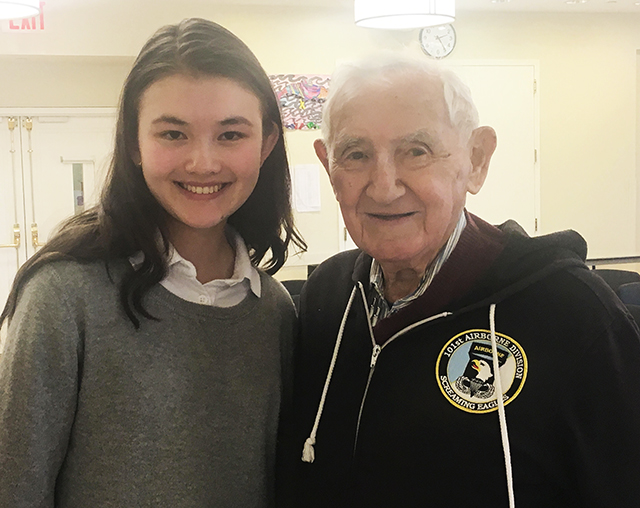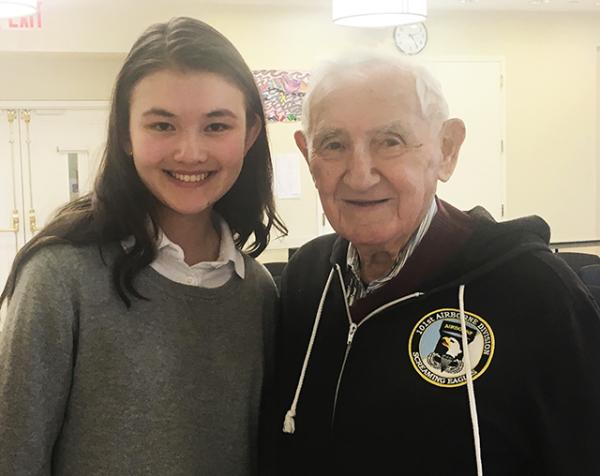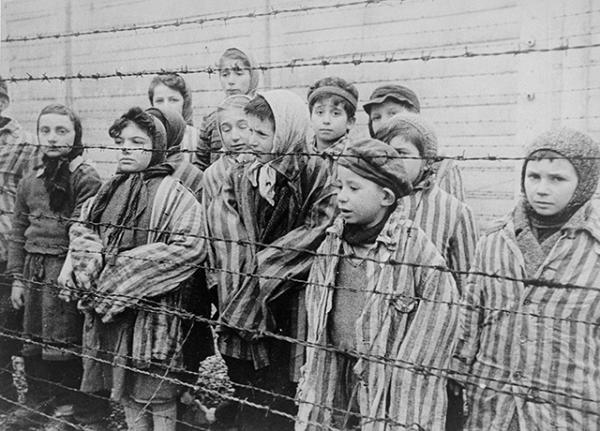KID REPORTERS’ NOTEBOOK
A Holocaust Survivor Shares His Story


Charlotte with Holocaust survivor and U.S. military veteran David Wisnia
For most kids, understanding the horrors of World War II and the Holocaust is nearly impossible. That’s why it’s important to hear firsthand accounts from eyewitnesses.
I recently had the privilege of talking with Holocaust survivor and United States military veteran David Wisnia at my school in New York City. Wisnia described his journey from prisoner at Auschwitz, a notorious concentration camp in Poland, to soldier in the United States Army.
Born to a Jewish family in Poland in 1926, Wisnia was a talented singer who performed on the radio. His carefree childhood was interrupted in 1939, when Adolf Hitler’s German Army invaded Poland.
In 1941, after the Nazis invaded Russia, they began to massacre the Polish people in large numbers, Wisnia says. One day that year, he came home to find that every member of his immediate family had been shot dead by Nazi soldiers.

Child survivors of Auschwitz stand behind a barbed wire fence in 1945. That year, World War II ended in the defeat of Germany and its allies. By then, the Nazis had murdered an estimated six million Jews, including members of David Wisnia’s immediate family.
THE DEFEAT OF GERMANY
In 1942, Wisnia was sent to Auschwitz, “the hell of the hell,” as he calls it. His voice saved him. As a performer at Nazi parties, Wisnia became a “privileged” prisoner. He did not have to labor as hard as the other prisoners, and he received larger food rations.
In the winter of 1944, the Nazis evacuated Auschwitz as the Russian Army advanced. Wisnia and the other prisoners were sent on a grueling march to Dachau (DAH-kow), a notorious concentration camp in Germany.
At Dachau, Wisnia was no longer a “privileged” prisoner. Desperate to get out, he escaped and eventually became a member of the 101st Airborne Division, an elite fighting unit of the U.S. Army.
Because Wisnia spoke many languages, including German, he was given the role of convincing Nazi soldiers to surrender. On May 8, 1945, Germany finally surrendered. The U.S. and its allies were able to declare victory.
“A PLACE WITH FREEDOM”
After the war, Army friends helped Wisnia emigrate to the U.S. Upon his arrival in New Jersey, Wisnia kissed the ground. “I never believed there existed such a place with freedom to do what you want,” he said.
Wisnia has led a happy life in the U.S. Soon after his arrival, he met and married a woman named Hope, and they had four children.
Now in his early 90s, Wisnia continues to share his story of survival. “Appreciate what you have,” he advises young people, “and show a little respect for the next person.”
